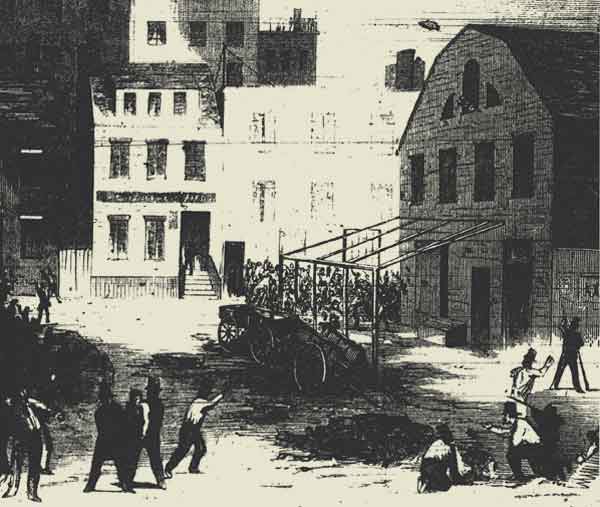

Our story of New York in 1857 continues with the gang riots that followed immediately from the resolution of the police riot situation.
From the Diary of Geo. Templeton Strong
New York Riot, July 5, 1857
“….the Old Police being disbanded and the New Police as yet inexperienced and imperfectly organized, we are in an insecure and unsettled state at present….It seems to have been a battle between Irish Blackguardsmen and Native Bowery Blackguardsmen, the belligerents afterwards making common cause against the police and uniting to resist their common enemy.”
___________________________________
From HARPER’S WEEKLY, July 11, 1857.
RIOTS IN NEW YORK.
The disbandment of the Municipal Police (whom the Albany Commissioners refused to re-employ) has been the signal for deplorable riots. From Friday evening to Monday
morning the city – particularly that portion of it embraced within the Sixth Ward – has been in a state of riot. An organized gang of ruffians, residing in and about Mulberry Street, and known as the “Roach Guards,” consisting chiefly of Irishmen, began an affray which ended in the loss of six lives and the wounding of over one hundred men. They began by making an onslaught, with knives and pistols, upon the Metropolitan Policemen who were on duty near the Bowery Theatre. The same gang, being reinforced, assailed the drinking saloon No. 40 Bowery, the fixtures of which they demolished after assaulting the inmates, whom they suspected of being members of another antagonistic Club known as the “Atlantic Guards.” By great exertions on the part of the police, and private citizens who aided the police, this difficulty was temporarily quelled, but not until nearly a dozen persons had been more or less injured by bludgeons and pistol-balls. The riot broke out afresh later in the day, and with such violence that the police, in attempting to suppress it were badly beaten, being assailed from the house-tops and windows all along Bayard and Mulberry Streets, where the rival “Guards” were met, fighting from behind barricades. Firearms were brought into requisition by the rioters, six of whom were killed and seventy or eighty wounded. Of the police, a special officer, named Jenkins, is lying at the City Hospital, mortally wounded, it is feared. Some others, it is thought, will die of their injuries. The fight was ended about nightfall – about the time that three regiments were called out to maintain order. Comparative quiet reigned the remainder of the night. A large number of the rioters were captured by the police.
 |
||
On Sunday there was not much fighting until near seven o’clock, when a riot broke out in Centre and Anthony streets, in which sticks, stones, bricks from the chimneys of the houses, and guns and pistols were freely used, and with effect. Nine men were seriously wounded, and taken to the City Hospital. Finally, the military were marched up and down through the Ward, and the rioters dispersed. There were lesser riots in other parts of the city. In Bayard Street barricade were again erected, but after the military appeared they were removed without violence. At midnight all was quiet, and only one regiment was to remain under arms until morning.
Since then there has been no fresh outbreak. The disturbance is ascribed partly to the turbulence of the Irish, and partly to the inefficiency of the police.
From HARPER’S WEEKLY a few days later…(editorial)
END OF THE POLICE DISPUTE
“If the Court rules that the State is justified in superceding our police by a force of its own, the Mayor will interpose no objection to the execution of the law so far as it can be expected.” Harper’s Weekly, June 27
The Court of Appeals has ruled that the State Legislature was justified in superceding our police by a State force; and as we predicted, the Mayor has ceased his opposition, and the law has gone into full effect. It only remains now for all good and honest citizens to give it a fair trial, and to set an example of frank and thorough submission to the law.
The disturbances which have taken place since the municipal police were disbanded; the riots which disgraced our National Anniversary; the spirit of blood-thirstiness and violence evinced by a portion of the denizens of the Sixth Ward during the nights of the fourth and fifth; the insolent turbulence of the Irish; all alike point to the paramount necessity of upholding the supremacy of the law in this metropolis, at whatever cost of civic pride or party principle. We hope, therefore, that the persons who felt it their duty to resist to the uttermost the legislative Act for the substitution of a State for our municipal police, so long as that Act could be lawfully resisted, will now rally bodily to the support of the Albany Commissioners, and help them, honestly, fearlessly, like good citizens, to preserve the peace and enforce the laws. The polls are left for those who are dissatisfied with the present state of things; till they are open, submission is the only course open to men of honor and men of sense.
©2003 The Composing Stack Inc. ©2003 Gregory J. Christiano